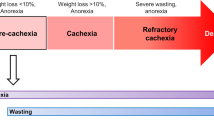Summary
Cancer cachexia has been listed as a major cause of death in cancer patients. In order to investigate the metabolic effects of the tumor on the host, we have evaluated an experimental model of cancer cachexia in the mouse (MAC16 colon adenocarcinoma), in which weight loss can reach 30–40% of initial weight with a tumor burden of only 2.5%, without a reduction in the intake of either food or water. The weight loss appears not to arise from tumor necrosis factor production, which is associated with a marked reduction in both food and water intake, but may be a result of catabolic factors produced by the tumor and present in the circulation. Both insulin and 3-hydroxybutyrate are effective inhibitors of the tumor catabolic factors in vitro and protect, to some extent, weight loss in vivo. However, whereas 3-hydroxybutyrate was associated with a reduction in tumor weight, insulin caused an enhancement, suggesting that the former may be more appropriate than the latter in the clinical treatment of cancer cachexia.
Similar content being viewed by others
References
Warren S. The immediate cause of death in cancer. Am. J. Med. Sci. 1932; 184: 610–615.
Strain AJ. Cancer cachexia in man: a review. Invest. Cell Pathol. 1979; 2: 181–193.
De Wys WD, Begg C, Lavin PT, Band PR, Bennett JM, Bertino JR, Cohen MH, Douglass HD Jr, Engstrom PF, Ezdinli EZ, Horton J, Johnson GJ, Mortel CG, Oken MM, Perlia C, Rosenbaum C, Silverstein MN, Skeel RT, Sponzo RW, and Tormey DC. Prognostic effect of weight loss prior to chemotherapy in cancer patients. Am. J. Med. 1980; 69: 491–497.
Costa G, Cachexia, the metabolic component of neoplastic diseases. Prog. Exp. Tumor Res. 1963; 3: 321–369.
Burke M, Bryson EI, and Kark AE. Dietary intakes, resting metabolic rates and body composition in benign and malignant gastrointestinal disease. Br. Med. J. 1980; 280: 211–215.
Garattini S, Bizzi A, Donelli MG, Guaitani A, Samanin R, and Spreafico F. Anorexia and cancer in animals and man. Cancer Treat. Rev. 1980; 7: 115–140.
Evans W, Makuch R, Clamon G, Feld R, Weiner RS, Moran E, Blum R, Shepherd FA, Jeejeebhoy KN, and De Wys WD. Limited impact of TPN on nutritional status during treatment for small cell lung cancer. Cancer Res. 1985; 45: 3347–3353.
Chlebowski RT. Critical evaluation of the role of nutritional support with chemotherapy. Cancer 1985; 55: 268–272.
Bibby MC, Double JA, Ali SA, Fearon KCH, Brennan RA, and Tisdale MJ. Characterization of a transplantable adenocarcinoma of the mouse colon producing cachexia in recipient animals. J. Natl. Cancer Inst. 1987; 78: 539–546.
Stovroff MC, Fraker DL, and Norton JA. Cachectin activity in the serum of cachectic, tumor-bearing rats. Arch. Surg. 1989; 124: 94–99.
Mider GB, Tesluk H, and Morton JJ. Effects of Walker carcinoma 256 on food intake, body weight and nitrogen metabolism of growing rats. Acta Un. Int. Cancer, 1948; 6: 409–420.
Nathanson L and Hall TC. Lung tumors: How they produce their syndromes. Ann. NY Acad. Sci. 1974; 230: 367–377.
Morrison SD, Moley LF, and Norton JA. Contribution of inert mass to experimental cancer cachexia in rats. J. Natl. Cancer Inst. 1984; 73: 991–998.
Theologides A. Pathogenesis of cachexia in cancer: A review and a hypothesis. Cancer 1972; 29: 484–488.
Theologides A. Cancer cachexia, Cancer. 1979; 43: 2004–2012.
Beck SA and Tisdale MJ. Production of lipolytic and proteolytic factors by a muring tumor-producing cachexia in the host. Cancer Res. 1987; 47: 5919–5923.
Kitada S, Hayes EF, and Mead JF. A lipid mobilising factor in serum of tumour-bearing mice. Lipids 1980; 15: 168–174.
Kitada S, Hays EF, and Mead JF, Characterization of a lipid mobilizing factor from tumours. Prog. Lipid Res. 1981; 28: 823–826.
Masuno H, Yamasaki N, and Okuda H. Purification and characterisation of lipolytic factor (toxohormone-L) from cell-free fluid of ascites sarcoma 180. Cancer Res. 1981; 41: 284–288.
Masuno H, Yoshimura H, Ogawi N, and Okuda H. Isolation of lipolytic factor (toxohormone- L) from ascites fluid of patients with hepatoma and its effect on feeding behaviour. Eur. J. Cancer Clin. Oncol. 1984; 20: 1177–1185.
Beutler B and Cerami A. Cachectin and tumour necrosis factor as two sides of the same biological coin. Nature 1986; 320: 584–588.
Mahony SM, Beck SA, and Tisdale MJ. Comparison of weight loss induced by recombinant tumour necrosis factor with that produced by a cachexia-inducing tumour. Br. J. Cancer 1988; 57: 385–389.
Fearson KCH, Borland W, Preston T, Tisdale MJ, Shenkin A, and Caiman KC. Cancer cachexia: influence of systemic ketosis on substrate levels and nitrogen metabolism. Am. J. Clin. Nutr. 1988; 47: 42–48.
Schein PS, Kisner D, Haller D, Blecher M, and Hamosh M. Cachexia of malignancy. Potential role of insulin in nutritional management. Cancer 1979; 43: 2070–2076.
Author information
Authors and Affiliations
Rights and permissions
About this article
Cite this article
Tisdale, M.J., Beck, S.A. Cancer cachexia. Int J Pancreatol 7, 141–150 (1990). https://doi.org/10.1007/BF02924231
Issue Date:
DOI: https://doi.org/10.1007/BF02924231




